Laravel 10 CRUD Application Example Tutorial
Hi Developer,
Today, I will let you know an example of laravel 10 crud operation example. Here you will learn to build a laravel 10 crud application. We will use laravel 10 crud application for beginners. It's a simple example of how to create a crud in laravel 10. Alright, let’s dive into the steps.
CRUD Meaning: CRUD is an acronym that comes from the world of computer programming and refers to the four functions that are considered necessary to implement persistent storage in your application: create, read, update, and delete.
In this example, we will create a product crud application using laravel 10. we will create a products table with name and detail columns using laravel 10 migration, then we will create routes, controller, view, and model files for the product module. we will use bootstrap 5 for design now. so let's follow the below step to create a crud operation with laravel 10.
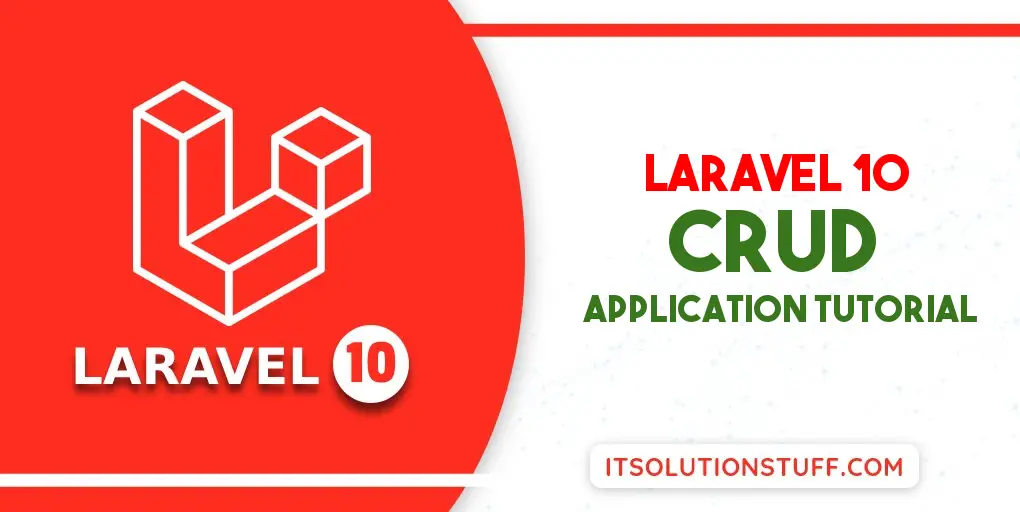
Step for Laravel 10 CRUD Operation Example
- Step 1: Install Laravel 10
- Step 2: Database Configuration
- Step 3: Create Migration
- Step 4: Create Controller and Model
- Step 5: Add Resource Route
- Step 6: Add Blade Files
- Run Laravel App
Step 1: Install Laravel 10 App
Let us begin the tutorial by installing a new laravel 10 application. if you have already created the project, then skip the following step.
composer create-project laravel/laravel example-app
Step 2: Database Configuration
In the second step, we will make a database configuration, we need to add the database name, MySQL username, and password. So let's open the .env file and fill in all details like as below:
.env
DB_CONNECTION=mysql
DB_HOST=127.0.0.1
DB_PORT=3306
DB_DATABASE=here your database name(blog)
DB_USERNAME=here database username(root)
DB_PASSWORD=here database password(root)
Step 3: Create Migration
Here, we will create a "products" table using laravel migration. so let's use the following command to create a migration file.
php artisan make:migration create_products_table --create=products
After this command you will find one file in the following path "database/migrations" and you have to put below code in your migration file for creating the products table.
<?php
use Illuminate\Database\Migrations\Migration;
use Illuminate\Database\Schema\Blueprint;
use Illuminate\Support\Facades\Schema;
return new class extends Migration
{
/**
* Run the migrations.
*
* @return void
*/
public function up()
{
Schema::create('products', function (Blueprint $table) {
$table->id();
$table->string('name');
$table->text('detail');
$table->timestamps();
});
}
/**
* Reverse the migrations.
*
* @return void
*/
public function down()
{
Schema::dropIfExists('products');
}
};
Now you have to run this migration by the following command:
php artisan migrate
Step 4: Create Controller and Model
In this step, now we should create new resource controller as ProductController. So run bellow command and create new controller. bellow controller for create resource controller.
php artisan make:controller ProductController --resource --model=Product
After the bellow command, you will find a new file in this path "app/Http/Controllers/ProductController.php".
In this controller will create seven methods by default as bellow methods:
1)index()
2)create()
3)store()
4)show()
5)edit()
6)update()
7)destroy()
So, let's copy bellow code and put on ProductController.php file.
app/Http/Controllers/ProductController.php
<?php
namespace App\Http\Controllers;
use App\Models\Product;
use Illuminate\Http\RedirectResponse;
use Illuminate\Http\Request;
use Illuminate\Http\Response;
use Illuminate\View\View;
class ProductController extends Controller
{
/**
* Display a listing of the resource.
*/
public function index(): View
{
$products = Product::latest()->paginate(5);
return view('products.index',compact('products'))
->with('i', (request()->input('page', 1) - 1) * 5);
}
/**
* Show the form for creating a new resource.
*/
public function create(): View
{
return view('products.create');
}
/**
* Store a newly created resource in storage.
*/
public function store(Request $request): RedirectResponse
{
$request->validate([
'name' => 'required',
'detail' => 'required',
]);
Product::create($request->all());
return redirect()->route('products.index')
->with('success','Product created successfully.');
}
/**
* Display the specified resource.
*/
public function show(Product $product): View
{
return view('products.show',compact('product'));
}
/**
* Show the form for editing the specified resource.
*/
public function edit(Product $product): View
{
return view('products.edit',compact('product'));
}
/**
* Update the specified resource in storage.
*/
public function update(Request $request, Product $product): RedirectResponse
{
$request->validate([
'name' => 'required',
'detail' => 'required',
]);
$product->update($request->all());
return redirect()->route('products.index')
->with('success','Product updated successfully');
}
/**
* Remove the specified resource from storage.
*/
public function destroy(Product $product): RedirectResponse
{
$product->delete();
return redirect()->route('products.index')
->with('success','Product deleted successfully');
}
}
Step 5: Add Resource Route
Here, we need to add resource route for product crud application. so open your "routes/web.php" file and add following route.
routes/web.php
<?php
use Illuminate\Support\Facades\Route;
use App\Http\Controllers\ProductController;
/*
|--------------------------------------------------------------------------
| Web Routes
|--------------------------------------------------------------------------
|
| Here is where you can register web routes for your application. These
| routes are loaded by the RouteServiceProvider within a group that
| contains the "web" middleware group. Now create something great!
|
*/
Route::resource('products', ProductController::class);
Step 6: Add Blade Files
In last step. In this step we have to create just blade files. So mainly we have to create layout file and then create new folder "products" then create blade files of crud app. So finally you have to create following bellow blade file:
1) layout.blade.php
2) index.blade.php
3) create.blade.php
4) edit.blade.php
5) show.blade.php
So let's just create following file and put bellow code.
resources/views/products/layout.blade.php
<!DOCTYPE html>
<html>
<head>
<title>Laravel 10 CRUD Application - ItSolutionStuff.com</title>
<link href="https://cdn.jsdelivr.net/npm/bootstrap@5.0.2/dist/css/bootstrap.min.css" rel="stylesheet">
</head>
<body>
<div class="container">
@yield('content')
</div>
</body>
</html>
resources/views/products/index.blade.php
@extends('products.layout')
@section('content')
<div class="row">
<div class="col-lg-12 margin-tb">
<div class="pull-left">
<h2>Laravel 10 CRUD Example from scratch - ItSolutionStuff.com</h2>
</div>
<div class="pull-right">
<a class="btn btn-success" href="{{ route('products.create') }}"> Create New Product</a>
</div>
</div>
</div>
@if ($message = Session::get('success'))
<div class="alert alert-success">
<p>{{ $message }}</p>
</div>
@endif
<table class="table table-bordered">
<tr>
<th>No</th>
<th>Name</th>
<th>Details</th>
<th width="280px">Action</th>
</tr>
@foreach ($products as $product)
<tr>
<td>{{ ++$i }}</td>
<td>{{ $product->name }}</td>
<td>{{ $product->detail }}</td>
<td>
<form action="{{ route('products.destroy',$product->id) }}" method="POST">
<a class="btn btn-info" href="{{ route('products.show',$product->id) }}">Show</a>
<a class="btn btn-primary" href="{{ route('products.edit',$product->id) }}">Edit</a>
@csrf
@method('DELETE')
<button type="submit" class="btn btn-danger">Delete</button>
</form>
</td>
</tr>
@endforeach
</table>
{!! $products->links() !!}
@endsection
resources/views/products/create.blade.php
@extends('products.layout')
@section('content')
<div class="row">
<div class="col-lg-12 margin-tb">
<div class="pull-left">
<h2>Add New Product</h2>
</div>
<div class="pull-right">
<a class="btn btn-primary" href="{{ route('products.index') }}"> Back</a>
</div>
</div>
</div>
@if ($errors->any())
<div class="alert alert-danger">
<strong>Whoops!</strong> There were some problems with your input.<br><br>
<ul>
@foreach ($errors->all() as $error)
<li>{{ $error }}</li>
@endforeach
</ul>
</div>
@endif
<form action="{{ route('products.store') }}" method="POST">
@csrf
<div class="row">
<div class="col-xs-12 col-sm-12 col-md-12">
<div class="form-group">
<strong>Name:</strong>
<input type="text" name="name" class="form-control" placeholder="Name">
</div>
</div>
<div class="col-xs-12 col-sm-12 col-md-12">
<div class="form-group">
<strong>Detail:</strong>
<textarea class="form-control" style="height:150px" name="detail" placeholder="Detail"></textarea>
</div>
</div>
<div class="col-xs-12 col-sm-12 col-md-12 text-center">
<button type="submit" class="btn btn-primary">Submit</button>
</div>
</div>
</form>
@endsection
resources/views/products/edit.blade.php
@extends('products.layout')
@section('content')
<div class="row">
<div class="col-lg-12 margin-tb">
<div class="pull-left">
<h2>Edit Product</h2>
</div>
<div class="pull-right">
<a class="btn btn-primary" href="{{ route('products.index') }}"> Back</a>
</div>
</div>
</div>
@if ($errors->any())
<div class="alert alert-danger">
<strong>Whoops!</strong> There were some problems with your input.<br><br>
<ul>
@foreach ($errors->all() as $error)
<li>{{ $error }}</li>
@endforeach
</ul>
</div>
@endif
<form action="{{ route('products.update',$product->id) }}" method="POST">
@csrf
@method('PUT')
<div class="row">
<div class="col-xs-12 col-sm-12 col-md-12">
<div class="form-group">
<strong>Name:</strong>
<input type="text" name="name" value="{{ $product->name }}" class="form-control" placeholder="Name">
</div>
</div>
<div class="col-xs-12 col-sm-12 col-md-12">
<div class="form-group">
<strong>Detail:</strong>
<textarea class="form-control" style="height:150px" name="detail" placeholder="Detail">{{ $product->detail }}</textarea>
</div>
</div>
<div class="col-xs-12 col-sm-12 col-md-12 text-center">
<button type="submit" class="btn btn-primary">Submit</button>
</div>
</div>
</form>
@endsection
resources/views/products/show.blade.php
@extends('products.layout')
@section('content')
<div class="row">
<div class="col-lg-12 margin-tb">
<div class="pull-left">
<h2> Show Product</h2>
</div>
<div class="pull-right">
<a class="btn btn-primary" href="{{ route('products.index') }}"> Back</a>
</div>
</div>
</div>
<div class="row">
<div class="col-xs-12 col-sm-12 col-md-12">
<div class="form-group">
<strong>Name:</strong>
{{ $product->name }}
</div>
</div>
<div class="col-xs-12 col-sm-12 col-md-12">
<div class="form-group">
<strong>Details:</strong>
{{ $product->detail }}
</div>
</div>
</div>
@endsection
Run Laravel App:
All the required steps have been done, now you have to type the given below command and hit enter to run the Laravel app:
php artisan serve
Now, Go to your web browser, type the given URL and view the app output:
http://localhost:8000/products
You will see layout as like bellow:
List Page:
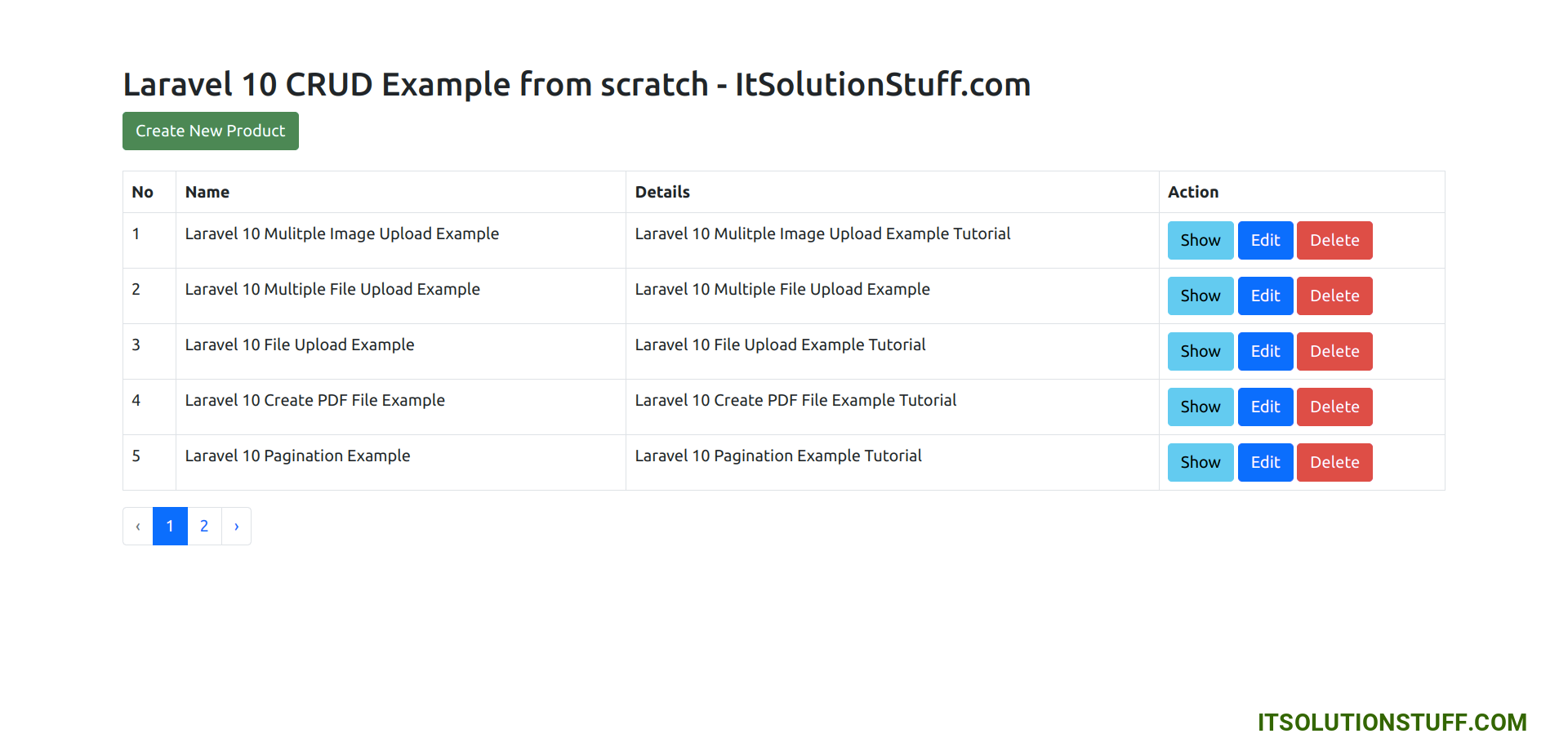
Add Page:
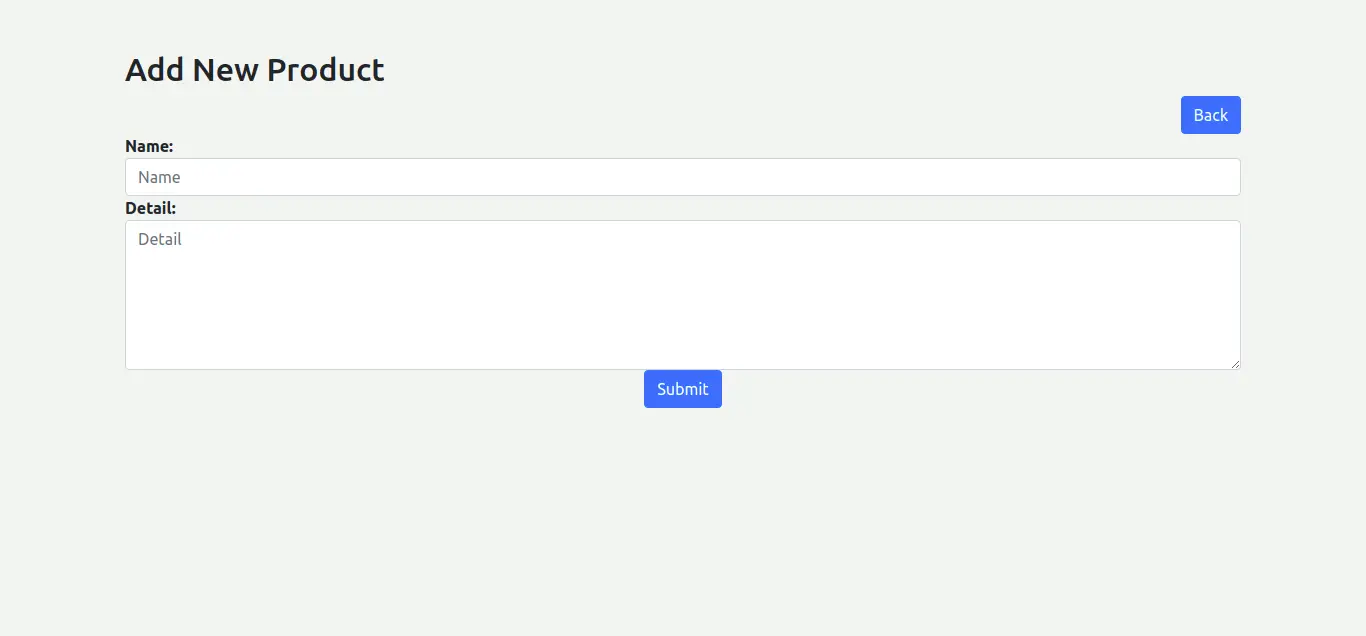
Edit Page:
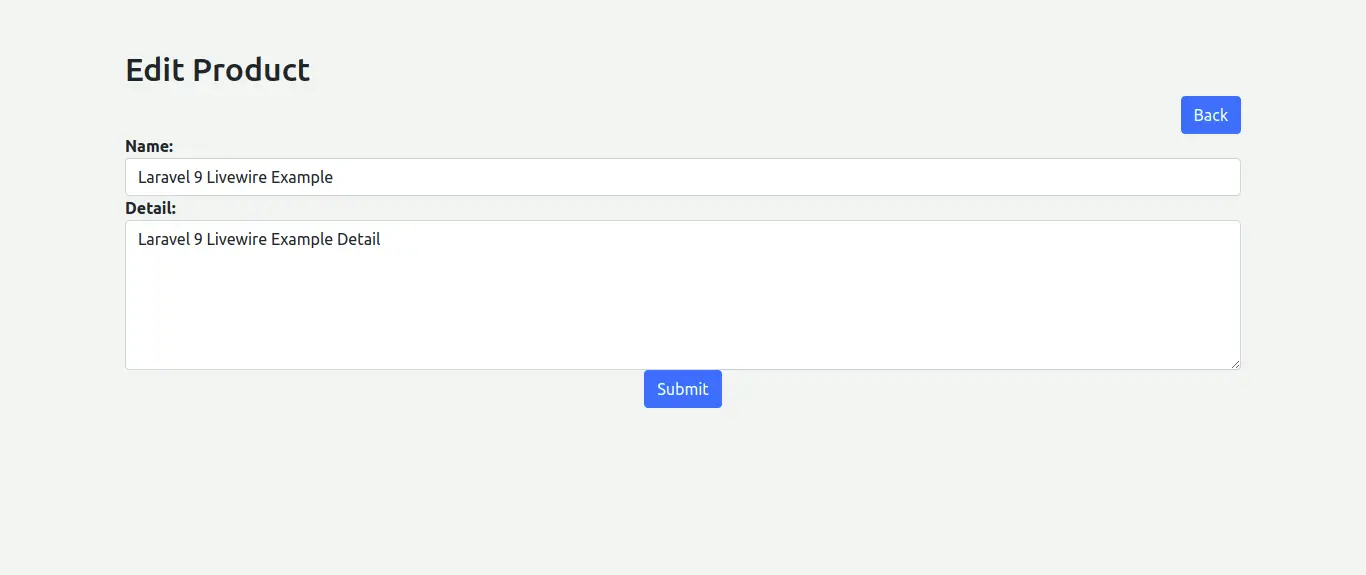
Show Page:
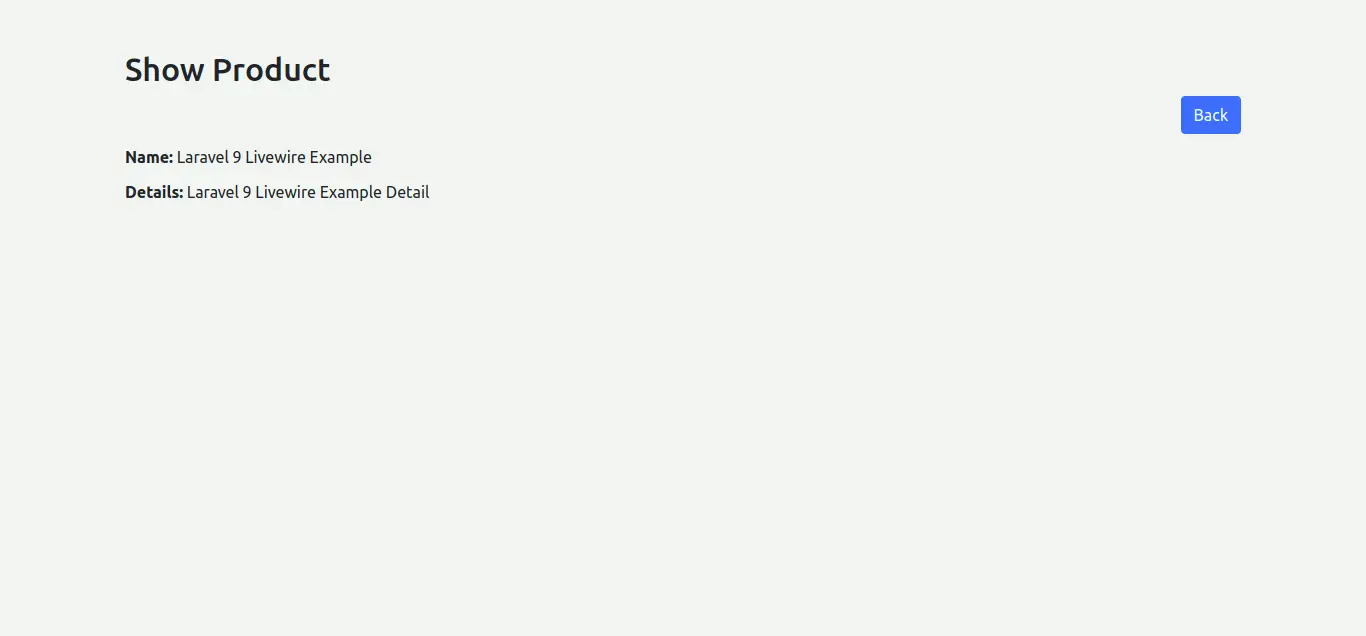
You can download code from git: Download Code from Github for Laravel 10 CRUD App
I hope it can help you...

